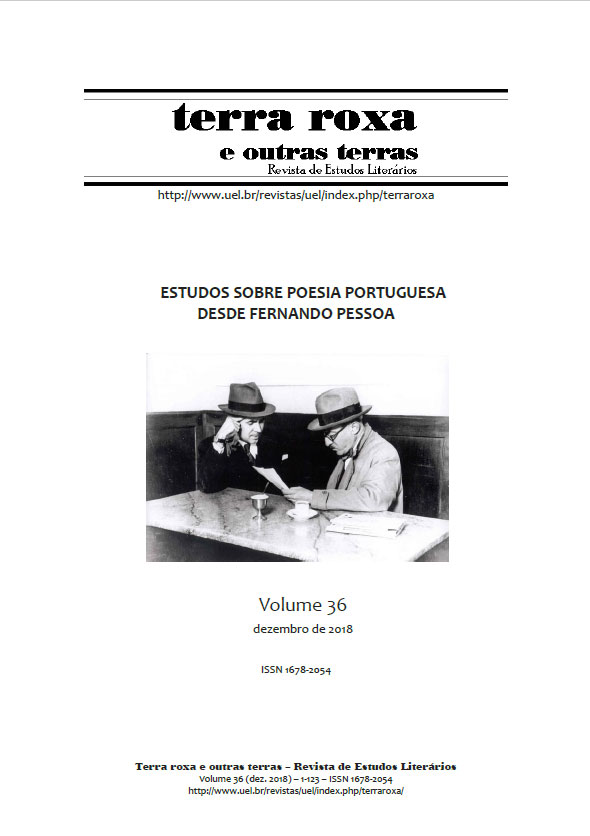I have fever and I write: tradition and rupture in poetry of Orpheu
DOI:
https://doi.org/10.5433/1678-2054.2018v36p76Keywords:
Orpheu, Fernando Pessoa, Álvaro de Campos, Nostalgic FuturismAbstract
Given the risks of approaching a subject so relevant to Portuguese literature, which laid the foundations of its modernity, it is important to say that Orpheu magazine, literary landmark of modernism in the land of Camões, has shaved paradigms inaugurating so many others. Thus, trying to better develop this theme, what I intend to address here may work as a kind of relativization on the manifestations of Futurism in Portugal, having as a matrix of analysis the poems of the heteronym Álvaro de Campos, "Ode Triunfal", released in the first number of the mentioned publication; as well as the "anti-futurist" poem "No volante", written in 1928. The curious thing is that some critics, like Fernando Cabral Martins and Leyla Perrone-Moisés, even defend that such avant-garde atmosphere of the mentioned period would reveal a confused pre-Futurism in Portugal, or a Nostalgic Futurism, in fact. Thus, highlighting the importance of Orphism as the novelty that would sketch several of the elements that would become crucial for the establishment of the Portuguese cultural identity in the course of the twentieth century to the present day, the question that most interests me when considering the proposed question is - Have Fernando Pessoa/Álvaro de Campos practiced Futurism as proclaimed by Marinetti?Downloads
References
LOURENÇO, Eduardo. Pessoa, rei da nossa Baviera. Lisboa: Gradiva, 2008.
MARTINS, Fernando Cabral (coord.). Dicionário de Fernando Pessoa e do Modernismo Português. São Paulo: Leya, 2010.
PESSOA, Fernando. Correspondência 1905-1922. Manuela Parreira da Silva (org.). Lisboa: Assírio e Alvim, 1999.
PESSOA, Fernando. Mensagem - Poemas esotéricos. Edición crítica. José Augusto Seabra (org.). Madrid: ALLCA XX, 1997.
PESSOA, Fernando. Obra poética. Rio de Janeiro: Nova Aguilar, 1977.
PESSOA, Fernando. Páginas de Estética e de Teoria Literárias. Fernando Pessoa. Lisboa: Ática, 1966.
SÁ-CARNEIRO, Mário de. Antologia. Cleonice Berardinelli (org.). Rio de Janeiro: Edições de Janeiro, 2015.
SÁ-CARNEIRO, Mário de. Cartas a Fernando Pessoa. 2ª ed. Vol. I. Lisboa: Ática,1992.
Downloads
Published
How to Cite
Issue
Section
License
Copyright (c) 2019 Terra Roxa e Outras Terras: Revista de Estudos Literários

This work is licensed under a Creative Commons Attribution 4.0 International License.
Authors who publish in this journal agree to the following terms:
a) The authors retain the copyright and grant the journal the right of first publication, the work being simultaneously licensed under the Creative Commons Attribution-NonCommercial 4.0 International License, allowing the sharing of the work with acknowledgment of the authorship of the work and initial publication in this journal.
b) Authors are authorized to assume additional contracts separately, for non-exclusive distribution of the version of the work published in this journal (eg, publish in an institutional repository or as a book chapter), with acknowledgment of authorship and initial publication in this journal.
c) Authors are allowed and encouraged to publish and distribute their work online (e.g. in institutional repositories or on their personal page) after the editorial process, as this can generate productive changes as well as increase impact and citation of the published work (See The Effect of Open Access).
d) The authors of the approved works authorize the journal to, after publication, transfer their content for reproduction in content indexers, virtual libraries and the like.
e) The authors assume that the texts submitted for publication are of their original creation, taking full responsibility for their content in case of any objection by third parties.



















